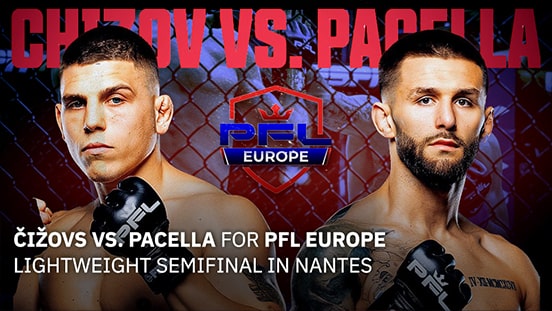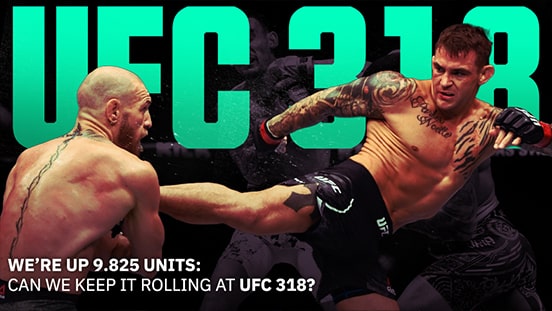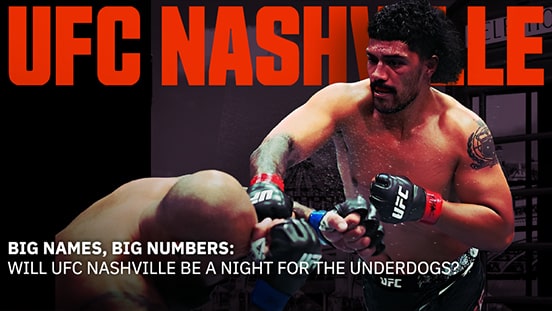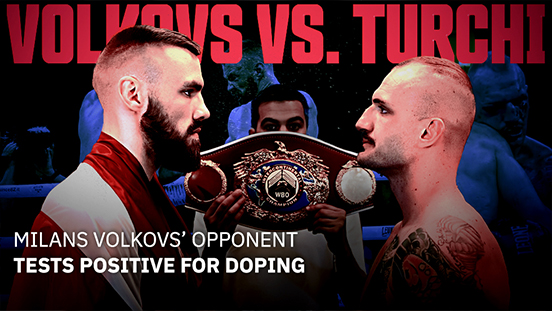Latvian boxer Milans Volkovs has fully emerged in the international boxing scene. In May of 2024, Volkovs went up against Italy-based cruiserweight Oronzo Biradi at York Hall in London. Volkovs delivered a strong performance, but Biradi’s consistent offense kept him just ahead, earning him a narrow but deserved victory on points.
Undeterred, Volkovs returned to the ring with enhanced focus and preparation in October of 2024 for a significant matchup against British fighter Tommy Fletcher. Standing at 6’7″ and previously unbeaten, Fletcher presented a considerable challenge as a powerful southpaw with a reach advantage. Volkovs countered Fletcher’s reach with a well-executed strategy that leveraged his defense, ultimately securing an impressive win.
In this interview, Volkovs talks about the unfortunate factors that played into his preparation against Biradi, and the tenfold effort that coined a victory against Fletcher.
What initially inspired you to take up boxing as a sport — and then, boxing as a career?
I was severely obese as a child. I was a big, fat kid who was made fun of. It wasn’t easy back then. Within me, there was a desire to be stronger, to stand up for myself, for my family, for my sister. Physically, I was weak and didn’t know how to do anything, so I was ready to face the older, bigger bullies, but only morally. I was no match physically.
The big turnaround was my first boxing lesson. My childhood friend Vladimirs and I were playing computer games. As far as I remember, we were about ten years old. He was already doing training at that time, while I had somehow gotten even fatter. And Vladimirs said to me: “Listen, let’s go to training together.” I didn’t know he was training in boxing. I’m from Sarkandaugava, where boxing was and still is a very popular sport. I used to drive by with my dad, and always said, “Oh, a boxing club, look!” My dad said I was still too young, that they didn’t train people like me there.
We called my parents and they agreed. Vladimirs’ mom took us to practice by tram. I was half-sick that day, but I knew something big was going to happen. I don’t know how, but I felt that it was a turning point in my life. I specifically memorized the date, without knowing what it would mean to me — 3rd of November, 2009. It’s like a small anniversary every year.
I started boxing like every little kid would: f*****g around more than getting any work done. When I was 12, and began watching other people, I developed a desire to train and compete more seriously. It was one of the leading clubs in Latvia at that time, with coach Vladimirs Korovins, who is well known in Latvian combat sports. I think that’s when things got serious. If initially my parents let me go train if I got bad grades, just so I wouldn’t sit at home, then eventually they made me fix my bad grades just so I could go to training.
A dream started to form in my head. A dream that I wanted to climb into the big ring, in the big arena, where people scream and watch you fight. I wanted to feel the energy. As my oldest coach said, “Only fools have no fear; or those who are already dead.” And you do still feel that same childlike excitement, you just have to learn to manage it.
I realized this in my last fight. If you’re afraid of jumping, it means you have to jump now. If you feel scared, it means you’re doing everything right. You can never be calm during the biggest moments of your life.
Which coaches or mentors have influenced you the most?
Several “life sensei” were involved in my upbringing as a human being and a person. I have at least four of them – my oldest coach from childhood, my physical trainer Romāns (nicknamed “Kuvalda”), Vaņa, who has been by my side, helping and supporting me since I was 13… I’ve had many coaches, but I do want to mention one in particular: Igors Mesmers. That man is on the same level as God to me. He elevated my consciousness in boxing, in professional sports, in my faith.
I lost one fight in May. I got sick exactly two weeks before it. I gave up completely. I could see in Igors’ eyes that he wanted to support me and was there until the very end. I really felt that support. You really only read things like that in books. In real life, it’s so rare to make these kinds of connections. He’s not a coach who just thinks business — he puts his whole soul into us. My recent results are only good thanks to him.
You and your identity were most clearly shaped by your last two fights — the loss against Oronzo Biradi in May and the fresh win against Tommy Fletcher in October. How do you rate your own performance against Biradi?
Well, you can always do better. I didn’t push myself to the limit. First of all, that was the first time in my life I boxed eight whole rounds. Second, I knew that the guy was a European champion among amateurs, signed to “Queensberry Promotions” by Frank Warren. All in all, I knew it was going to be a tough and difficult fight.
I was in the best shape I could be. And then, in the second week of sparring. I got sick. It felt like my bones were breaking, and I was running a fever. It was like that for a week straight. On the fifth day, I realized there was no point. I came back for the first sparring session to see how bad the damage was. If I perfectly boxed eight rounds with Ričards Bolotņiks and Ralfs Vilcāns before, coming back after being sick, I was already humiliated in the third.
I was sure the fight would just get canceled. My coach and I sat down to talk about it, and we realized that we were going to take the risk. In the end, it was a very close fight. I didn’t take the second risk because I didn’t know how much strength I would realistically have. Now I know I could’ve pushed on further. But we certainly didn’t come back as losers.
How did you get sick?
It was a Tuesday. I ran sprints in the morning, and everything was fine. In the evening I went to boxing practice. I felt, clearly, that I was heavier. At that moment there were about 30 kids in the gym, too. Towards the end of the workout, I started to feel the weight right in my head — I was slow, couldn’t really move… Drove home hoping I wouldn’t get too sick. That night, I ran a fever.
Another aspect was that the weather was surprisingly good in May. And on that same Monday, Tuesday, the temperature dropped. Rapid changes in the weather always have a big impact on us. I wore my usual trainers, not the warm ones, so a puddle here and there… Yeah, it happened overnight.
“Gotta work on defense because he could’ve gotten beat, but his opponent wasn’t ready for that today.” This was a comment on your performance against Tommy Fletcher. Did you also feel that Fletcher was not ready for you?
He wasn’t ready. Igors and I put in a colossal amount of work into this. As an opponent, Fletcher was as awkward as possible for any right-handed fighter. First of all: he’s two meters tall. Second of all: he’s left-handed. And third of all: he has really long arms.
We brought in tall sparring partners as much as we could. One came from the Czech Republic, one was our own champion Bogdan. We tried to do everything we could to be fully prepared. We watched and analyzed videos, fights specifically of left-handed boxers, as well as fights where there is a remarkable height difference. It was a huge effort.
It turns out that we had prepared for a much more difficult scenario than was actually the case. Usually he would land hits and his opponents couldn’t do anything because they didn’t know how to work a machine like Fletcher.
But we already started eating him up at the weigh-in. I went into the room. I sat down, in this complete state of calm. I kept a kind of… cold-blooded attitude. He, on the other hand, was twitching, pacing around; you could feel that he was nervous. When we stoof face to face, I looked through Fletcher and saw that he was already starting to swim.
Before the fight, I remember he was walking around, smiling, while I just stood there, all serious. When he saw me, that smile was gone, and so was he. When the fight started — yes, I might have lost the first round, but I need to get roughed up a bit to play more aggressively.
What I remember most was that we looked each other in the eye the whole fight. Usually your focus is on the hands, on the shoulders… But I was looking straight into his eyes the whole fight. Every round, I was running to take the center, and every round, I started to put the combinations together. I understood what he was doing. My job was to move where he couldn’t reach me at all.
Did Fletcher surprise you at any point?
Not really. I got hit in the first round, which definitely made my head swim. But I know how to hold my punches. As Bogdans said, “You have to be able to hold a punch.” The guys that go flying, who disappear right after a hit lands… No, you have to be back, you have to lock right back in and look at your opponent. That’s all you have.
Would you agree that there was a lot of pressure on Fletcher to give a good performance? The more fights you have as an undefeated opponent, the harder it is to keep a title like that emotionally…
Exactly. I knew that Fletcher would be under pressure. Everybody came there to support him and watch him. We fought at his home where he’s very popular, they were his promoters and he had no losses. But most importantly, this time, Frank Warren himself was sitting at ringside. The god of boxing, Frank Warren!
When we started clinching after the third round, I looked over and Frank Warren was looking at me. I thought, “Oh, let’s go.” And that kept happening, every single time. I do a couple of combinations, I clinch, I look at Frank. In the fifth round, he started looking at me with a smile on his face.












